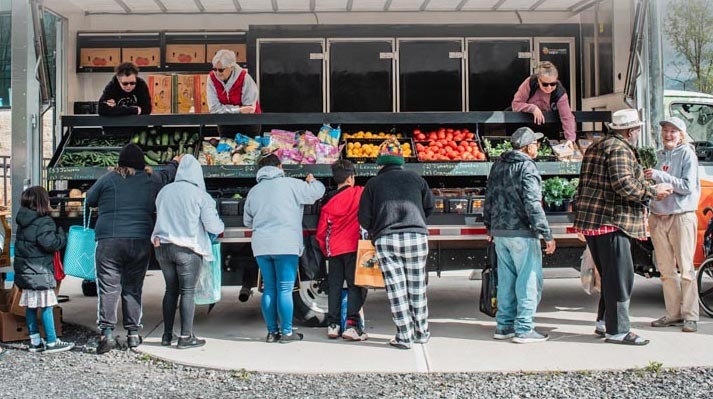SNAP & ACA in Limbo… What Next?
Local food banks, pantries, and community markets continue to play a crucial role.

As the Senate votes to reopen the government, SNAP benefits are still in flux, the fight for ACA subsidies stalls progress, and federal employees continue to work without pay.
Officials in Buncombe County are working to keep food access as stable as possible and to minimize the impact on local Supplemental Nutrition Assistance Program (SNAP) recipients.
More than 1.4 million North Carolinians—including thousands of children in Buncombe County, along with veterans, older adults, people with disabilities, and working families—rely on SNAP benefits to help afford groceries as costs rise.
“Food insecurity has grown more than ever since Hurricane Helene hit the region 13 months ago,” said David Sweatt, Director of the Buncombe County Department of Health and Human Services. Nearly 30,000 Buncombe residents—living in about 16,000 households—receive SNAP benefits each month.
Because Buncombe County has one of the highest costs of living in the state and many jobs are in low-wage, tourism-based industries such as restaurants and hotels, nearly half of all SNAP recipients are employed. “They have jobs,” Sweatt said, “but those jobs don’t pay enough to live here.” Statewide, about 46 percent of SNAP beneficiaries are working.
This summer, more than half of county households expressed “anxiety, worry, or stress” that another disaster might be coming. “Those folks were thinking about natural disasters,” Sweatt said, “not a man-made political standoff created by partisan officials in Washington, D.C.”
How SNAP Payments Work
SNAP benefits are not paid all at once; funds are added to recipients’ cards on a staggered schedule. Some receive benefits as early as the third of the month, while others don’t get them until the twenty-first. The earlier a household’s benefits are reloaded, the sooner they run out. About 1,500 local families receive their monthly benefits on the third—meaning their crisis has already begun. Those with remaining balances can continue using their cards until funds are depleted.
A Small Benefit with a Huge Impact
While the total amount of money distributed is large, individual SNAP benefits are modest—averaging about $171 per person and $344 per household each month. “For anyone who’s been grocery shopping lately, that’s not much,” Sweatt said. “But for those struggling, it’s essential.”
Many families also rely on the Women, Infants and Children (WIC) program, which provides food and nutritional support. WIC funding was secured only through November 15; unless Congress acts to reopen the government and fund it further, that program too may lapse.
A Political, Not Natural, Crisis
Both houses of Congress are controlled by the Republican Party, which has largely aligned with former President Donald Trump’s demands to curtail spending. The administration continues to press for elimination or reduction of subsidies under the Affordable Care Act (ACA) that have helped roughly 42 million Americans afford health insurance since the Covid-19 pandemic. Unless renewed, between seven and ten million citizens—including roughly five million children—could lose health coverage.
“When you combine what’s dispersed through WIC and SNAP,” Sweatt said, “that’s about $13 million per month added to our local food economy. We distribute roughly $5 million through our offices, but that money circulates right here in the community.” Those federal dollars also have a multiplier effect—each SNAP dollar generates about $1.30 in local economic activity, benefiting farmers, grocers, delivery drivers, and tax revenues while helping sustain a strong middle- and working-class economy.
County Services Continue
Sweatt emphasized that although SNAP benefits are disrupted, county services remain open. “Our Economic Services Office will continue to receive and process applications,” he said. “We want residents to stay connected with our caseworkers so that when funding resumes, they’ll already be in the system.”
However, the shutdown is still affecting county operations. “We typically receive $838,000 every week to help pay for Health and Human Services staff,” Sweatt said. “Since the shutdown began, that funding has stopped. Still, our employees remain committed and continue working on behalf of residents.”
Fortunately, Buncombe County Schools are not impacted. “Free meals for eligible students will continue to be served,” Sweatt said. He warned, however, that any extended interruption of benefits “will have a measurable impact on our region, which is still recovering from Helene over a year later.”
To meet growing need, the county is adding staff to handle increased calls, sending updates to SNAP recipients, and collaborating with community partners to strengthen the local safety net.
Community Food Access
The Department of Health and Human Services is also working with community engagement markets that distribute free food throughout the county—no eligibility requirements or paperwork needed. “Just show up,” Sweatt said. “The food is free.” A full schedule is available at www.buncombenc.gov/communityengagement.
Other Resources
Residents can call 2-1-1 or visit 211.org for statewide assistance, or go to www.buncombecountygovernment.org for local updates and support.
Senate Votes to Reopen Government
As of November 11, 2025, the United States Senate took a key vote to move toward ending the shutdown. The Senate voted 60-40 to advance a funding package that would fund most federal agencies through January 30, 2026, and includes full-year appropriations for certain programs through September 30, 2026.
The package includes full funding for SNAP through FY 2026, along with funding for the Department of Veterans Affairs, the Food and Drug Administration, and the Department of Agriculture.
It also includes language guaranteeing retroactive pay for federal employees who have been furloughed or working without pay during the shutdown.
However—and critically for the health-insurance component—the deal does not include an extension of the enhanced ACA premium tax credits. That component remains a major sticking point. While the Senate leadership has pledged to hold a vote on those credits in December, there is no guarantee of immediate action.
The bill now moves to the United States House of Representatives. House Speaker Mike Johnson has called on Representatives to reconvene quickly, with a vote expected within the next 36-48 hours.
What’s Ahead for Laid-Off and Furloughed Government Employees
With the shutdown extending for more than 40 days, thousands of federal employees across North Carolina and the country have faced furloughs or have been required to work without pay.
Roughly 670,000 federal employees are furloughed; about 730,000 continue working without pay. Some paychecks were missed starting Oct. 24; experts project that if the shutdown continues through December, more than 4.5 million paychecks could be withheld, representing $21 billion in missing wages.
The Government Employee Fair Treatment Act of 2019 guarantees that furloughed and excepted employees are entitled to back pay once the shutdown ends. Federal agencies such as the General Services Administration (GSA) have reaffirmed this. However, some notices recently sent to employees omitted explicit mention of back pay for furloughed (non-excepted) workers, prompting concern.
Many agencies have issued new furlough notices extending the non-duty, non-pay status through late November (or later) if funding is not restored.
What federal employees and their families should do:
- Stay in close contact with your agency’s human resources or payroll office to know your status (furlough or excepted).
- Monitor guidance from your agency and from the Office of Personnel Management (OPM) regarding back pay, benefits continuation, and recalls.
- Seek short-term financial assistance: local food banks, credit unions, emergency relief funds, and employee assistance programs are seeing increased demand.
- Stay alert for your agency recall notice and ensure that your contact information is current (email/phone) so you don’t miss important updates.
- Consider contacting your member of Congress to express concerns about delays in pay and benefits.
The ACA Impasse
At the center of the political standoff is whether Congress will renew the enhanced ACA premium tax credits—subsidies that lower the cost of monthly health-insurance premiums for millions of Americans. These credits, introduced during the pandemic and extended through the Inflation Reduction Act, are set to expire December 31, 2025.
If the subsidies expire, premiums for marketplace insurance plans could rise sharply in 2026—analysts estimate average premiums could more than double for many enrollees. Nationally, between 7 million and 10 million Americans could lose health coverage.
For residents of Buncombe County, the ACA subsidy debate has direct implications. Approximately 34,000 local residents purchase coverage through the ACA marketplace, many of whom receive enhanced tax credits reducing monthly premiums by hundreds of dollars. If those credits are allowed to expire, a typical Buncombe household could see premiums increase by $200-$400 per month. Local health-care providers warn that such increases could lead to coverage losses, higher uncompensated care, and greater strain on hospitals and clinics.
Local organizations, including Pisgah Legal Services and the Mountain Area Health Education Center (MAHEC), are providing free counseling and enrollment assistance during open enrollment. The Buncombe County Department of Health and Human Services is coordinating with regional partners to keep residents informed.
Residents can contact Pisgah Legal Services at (828) 253-0406 or MAHEC at (828) 257-4400, or visit HealthCare.gov or call (800) 318-2596 to renew plans. Officials urge people to not drop coverage, to renew early, and stay enrolled. “If the subsidies are restored later, you’ll be ready to benefit immediately,” Sweatt said.
What You Should Do
Residents are advised to monitor their Electronic Benefit Transfer (EBT) balances, keep applications current, and stay in touch with caseworkers. Until full federal funding resumes and uncertainty over the ACA subsidy is resolved, local food banks, pantries, and community markets will continue to play a crucial role.
Officials also encourage residents to stay informed through trusted local news outlets, plan for possible benefit delays, and contact their representatives in Congress to support continued funding for SNAP and ACA subsidies.





